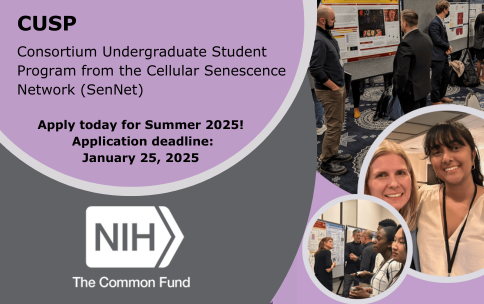
The SenNet Consortium Undergraduate Student Program (CUSP) is kicking off its third year with applications for 2025. CUSP students conduct research during a paid 10-week summer experience under the mentorship of scientists from the NIH Common Fund’s Cellular Senescence Network (SenNet) program. SenNet aims to identify and describe the differences in senescent cells across the body, across various states of human health, and across the lifespan.
Senescent cells are cells that have stopped dividing but do not die. As they accumulate in the body, these cells can release molecules that can either damage tissue or promote tissue growth. Biomedical researchers still have many unanswered questions about how, when, why, and where senescent cells form. Their rarity and diversity make them difficult to describe and identify in the body. The CUSP provides an opportunity for undergraduate students to conduct research that contributes to the advancement of the field of cellular senescence and our understanding of the roles senescent cells play in our bodies.
CUSP students gain valuable experience and obtain skills in laboratory techniques, while learning from experts in the field of cellular senescence. Fifteen students entered the first CUSP cohort in 2023, and 16 students participated in the second cohort in summer 2024. Research conducted by CUSP students spanned a variety of topics including senescence in chronic lung disease and human ovarian tissue, imaging techniques for senescent cells, novel therapeutic methods to remove senescent cells in the brain, and categorization of senescent cells in the liver. The experience acquired through the CUSP also provides a competitive edge to undergraduate students seeking careers in the field of cellular senescence. For example, a 2023 CUSP graduate is now investigating the neurological effects of HIV and its association with cellular senescence as a postbaccalaureate fellow for intramural research at the National Institute of Neurological Disorders and Stroke (NINDS).
Applications for the 2025 CUSP are now open and will close on January 25, 2025. The CUSP is dedicated to building a diverse, equitable, inclusive, and accessible internship program. Individuals of all backgrounds are encouraged to apply, including individuals from populations underrepresented in the clinical and biological sciences, such as underrepresented racial and ethnic groups, individuals with disabilities, individuals from disadvantaged backgrounds, and women.
Learn about the CUSP students and their research projects:
2023 cohort: https://sennetconsortium.org/internship-2023/
2024 cohort: https://sennetconsortium.org/internship-2024/


